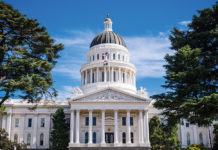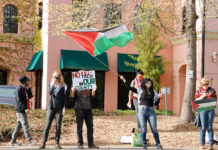A little over a week ago, I was driving with my father from Phoenix to San Diego. We were in the hills above San Diego when traffic on Interstate 8 came to an abrupt stop. Soon we saw signs telling us we were approaching a Border Patrol checkpoint. We noticed that the Border Patrol officer was having a long conversation with the driver of the car in front of us, finally motioning him over to the side where there were a number of well-armed officers. When I drove up, he motioned me on through with a wave and a simple, “Have a nice day.”
As I drove on, I saw that the car that had been pulled aside had what appeared to be a Latino family inside, now being questioned by the officers. It occurred to me that simply the color of my skin had given me a free pass through the checkpoint.
I understand the fears — some wild and irrational — about illegal immigration. And I understand the need, especially in these days of violent threats, to protect our borders. But it was still disturbing to go through a selection process seemingly based on skin color and perhaps one’s accent when speaking.
Reflecting on the recent tragic encounters of unarmed black men with law enforcement, San Francisco Chronicle columnist Jon Carroll wrote this: “Everybody in the black community has a ‘driving while black’ story. White people have no such comparable stories. Most black people know someone in jail. Most white people don’t. Racism is alive and well. Even though it’s no longer the dominant narrative, it continues to thrive…. America has tried to change; really, compared with, say 1960, things are better. But better is not the same as good, and the betterness has given lots of people the excuse to opt out.… People of good will have to get with the program. Most of all, white people of goodwill have to be active allies of people of color. Of course, that ain’t easy. But what other moral choice do you see?”
I wonder what would have been the reaction if Aaron Rodgers, Tom Brady and Andrew Luck, along with Russell Wilson, had worn “I Can’t Breathe” T-shirts during warm-ups before last weekend’s NFL Conference Championship games?
Living in a community with other people is tough work — in a family, in a church, in a town, in a country. Because clenched fists, closed minds and hearts, stereotypes and prejudices get us nowhere. They keep us locked in, closed off, blind to anything the “other” has to offer. No, true community takes courage — the courage to ask: can we stand each other enough to tolerate our differences; can we stand each other enough to take each other seriously — to see a face and not a caricature; to hear a voice and not a pre-recorded tape; to listen and hear the hurt behind the anger. Can we stand each other enough to ask: what’s important to you, where are you hurting, tell me more, I’m not sure I understand?
The Apostle Paul had a strange way of doing math. He insisted that no matter who we are, what our ethnic background, our gender, or even our religion, we are all one, all one body. “If one suffers, all suffer together. If one rejoices, all rejoice together.” He insisted that unless there is peace and joy and freedom for you, there can be no true peace or joy or freedom for me.
Jon Carroll is absolutely right. What other moral choice do we have?
Rev. Gene Nelson is is the pastor of the Community Church of Sebastopol.
48.9
F
Healdsburg
April 19, 2025







